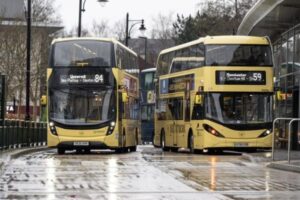Up to 15% of bus services across the country could be lost if bus funding comes to an end from July.
New research reveals people’s widespread concern over access to jobs, particularly among those without access to a car and those on lower incomes, if the Bus Recovery Grant is not replaced next month.
£260million a year would allow operators and local authorities to maintain services at current levels.
An Opinium study, commissioned by the Confederation of Passenger Transport (CPT), has revealed nearly 60% of bus passengers are worried about increased travel costs and being disconnected from work and leisure opportunities, if there are reductions in bus services. The new research comes as Government funding (the Bus Recovery Grant) is set to end in June, with an estimated 15% of the network at risk.
The survey found:
Over two thirds (68%) of low earners, as well as nearly three quarters (71%) of those who don’t drive regularly, are worried about how they would get to work if there were cuts to local bus services.
Almost two thirds of passengers with disabilities (64%) are worried that if there was a reduction in bus services it would make their regular method of travelling to work more expensive.
59% of all bus commuters are worried they would have a more difficult journey to their place of work if there was a reduction in bus services in their local area.
Nearly half of those without a full UK driving licence drive (49%) are worried about finding an alternative mode of transport if bus frequencies decrease.
Commenting on the findings, Graham Vidler, the CEO of the Confederation of Passenger Transport, said: “With over a million people travelling to work every day by bus, we know how important buses are to levelling up communities by keeping them connected to the jobs market.
“With the risk of service reductions looming, this new research shows that people are clearly worried about getting to work as well as having to spend more by travelling by car or being cut off all together.
“If the Government is really serious about levelling up and getting people back into the workplace, then it needs to back our buses for the long term.”























